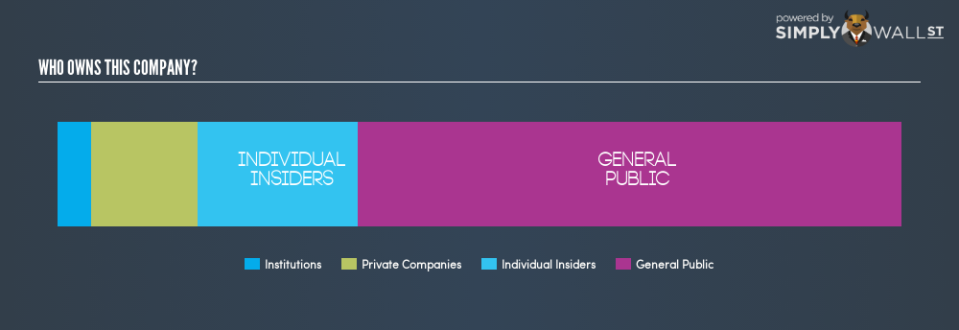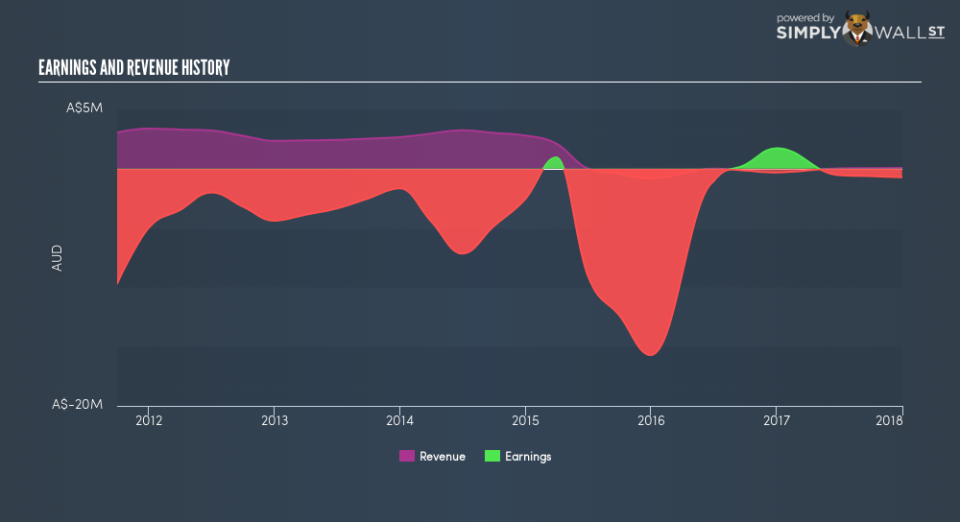Who Are The Major Shareholders Of Entek Energy Limited (ASX:ETE)?

If you want to know who really controls Entek Energy Limited (ASX:ETE), then you’ll have to look at the makeup of its share registry. Institutions often own shares in more established companies, while it’s not unusual to see insiders own a fair bit of smaller companies. Warren Buffett said that he likes ‘a business with enduring competitive advantages that is run by able and owner-oriented people’. So it’s nice to see some insider ownership, because it may suggest that management is owner-oriented.
Entek Energy is not a large company by global standards. It has a market capitalization of AU$5.2m, which means it wouldn’t have the attention of many institutional investors. Our analysis of the ownership of the company, below, shows that institutions don’t own many shares in the company. Let’s take a closer look to see what the different types of shareholder can tell us about ETE.
See our latest analysis for Entek Energy
What Does The Institutional Ownership Tell Us About Entek Energy?
Institutions typically measure themselves against a benchmark when reporting to their own investors, so they often become more enthusiastic about a stock once it’s included in a major index. We would expect most companies to have some institutions on the register, especially if they are growing.
Institutions own less than 5% of Entek Energy. That indicates that the company is on the radar of some funds, but it isn’t particularly popular with professional investors at the moment. So if the company itself can improve over time, we may well see more institutional buyers in the future. It is not uncommon to see a big share price rise if multiple institutional investors are trying to buy into a stock at the same time. So check out the historic earnings trajectory, below, but keep in mind it’s the future that counts most.
Entek Energy is not owned by hedge funds. As far I can tell there isn’t analyst coverage of the company, so it is probably flying under the radar.
Insider Ownership Of Entek Energy
While the precise definition of an insider can be subjective, almost everyone considers board members to be insiders. The company management answer to the board; and the latter should represent the interests of shareholders. Notably, sometimes top-level managers are on the board, themselves.
I generally consider insider ownership to be a good thing. However, on some occasions it makes it more difficult for other shareholders to hold the board accountable for decisions.
It seems insiders own a significant proportion of Entek Energy Limited. Insiders own AU$983.0k worth of shares in the AU$5.2m company. It is great to see insiders so invested in the business. It might be worth checking if those insiders have been buying recently.
General Public Ownership
The general public, who are mostly retail investors, collectively hold 64.3% of Entek Energy shares. This size of ownership gives retail investors collective power. They can and probably do influence decisions on executive compensation, dividend policies and proposed business acquisitions.
Private Company Ownership
We can see that Private Companies own 12.6%, of the shares on issue. It’s hard to draw any conclusions from this fact alone, so its worth looking into who owns those private companies. Sometimes insiders or other related parties have an interest in shares in a public company through a separate private company.
Next Steps:
It’s always worth thinking about the different groups who own shares in a company. But to understand Entek Energy better, we need to consider many other factors.
Many find it useful to take an in depth look at how a company has performed in the past. You can access this detailed graph of past earnings, revenue and cash flow .
If you would prefer check out another company — one with potentially superior financials — then do not miss this free free list of interesting companies, backed by strong financial data.
NB: Figures in this article are calculated using data from the last twelve months, which refer to the 12-month period ending on the last date of the month the financial statement is dated. This may not be consistent with full year annual report figures.
To help readers see past the short term volatility of the financial market, we aim to bring you a long-term focused research analysis purely driven by fundamental data. Note that our analysis does not factor in the latest price-sensitive company announcements.
The author is an independent contributor and at the time of publication had no position in the stocks mentioned. For errors that warrant correction please contact the editor at editorial-team@simplywallst.com.


